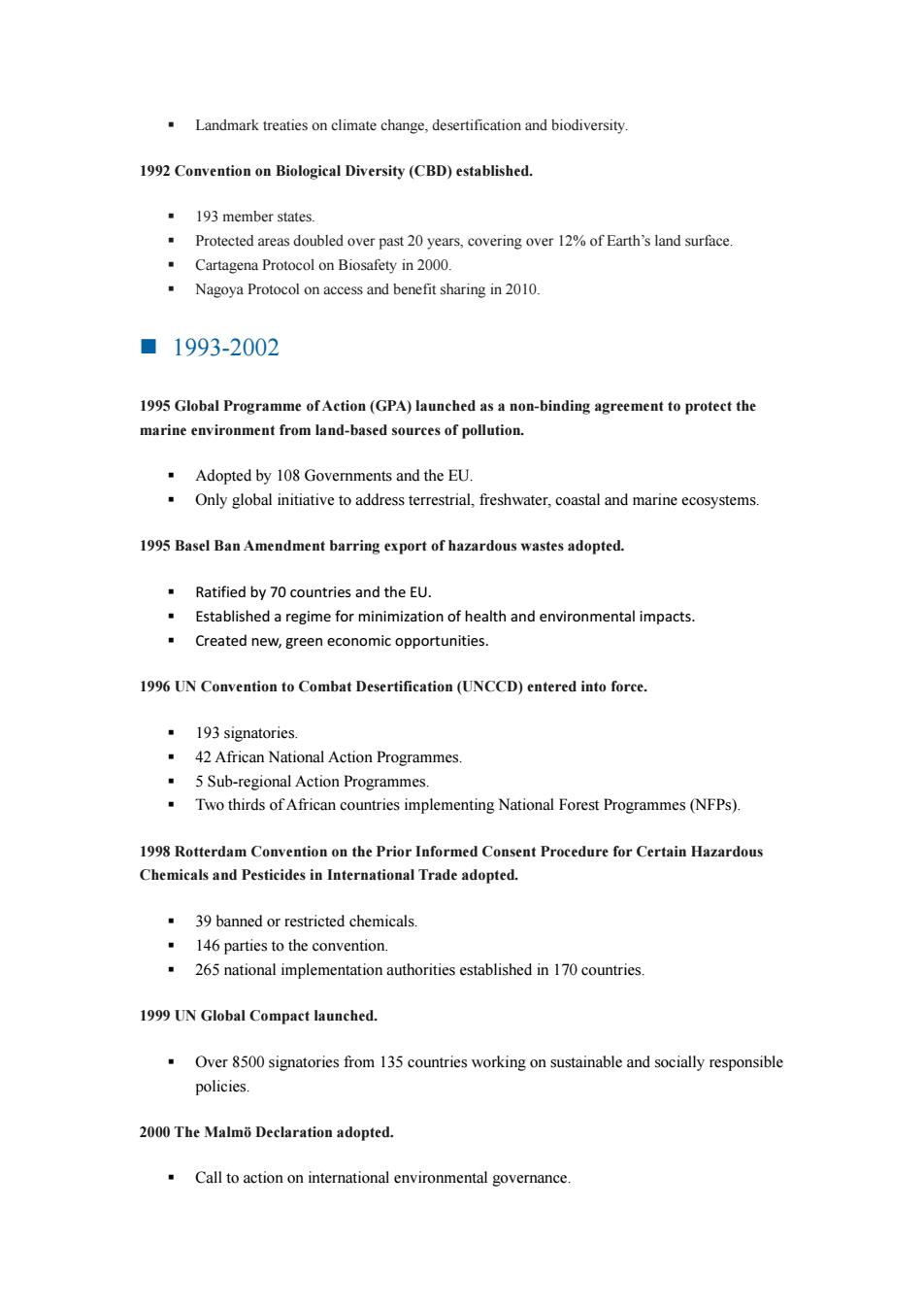正在加载图片...

"Landmark treaties on climate change,desertification and biodiversity. 1992 Convention on Biological Diversity (CBD)established. 193 member states. Protected areas doubled over past 20 years,covering over 12%of Earth's land surface. Cartagena Protocol on Biosafety in 2000. "Nagoya Protocol on access and benefit sharing in 2010. ■1993-2002 1995 Global Programme of Action(GPA)launched as a non-binding agreement to protect the marine environment from land-based sources of pollution. Adopted by 108 Governments and the EU. Only global initiative to address terrestrial,freshwater,coastal and marine ecosystems. 1995 Basel Ban Amendment barring export of hazardous wastes adopted. Ratified by 70 countries and the EU. Established a regime for minimization of health and environmental impacts. Created new,green economic opportunities 1996 UN Convention to Combat Desertification (UNCCD)entered into force. ·193 signatories. 42 African National Action Programmes. 5 Sub-regional Action Programmes. Two thirds of African countries implementing National Forest Programmes(NFPs). 1998 Rotterdam Convention on the Prior Informed Consent Procedure for Certain Hazardous Chemicals and Pesticides in International Trade adopted. "39 banned or restricted chemicals. .146 parties to the convention. .265 national implementation authorities established in 170 countries 1999 UN Global Compact launched. Over 8500 signatories from 135 countries working on sustainable and socially responsible policies 2000 The Malmo Declaration adopted. "Call to action on international environmental governance. Landmark treaties on climate change, desertification and biodiversity. 1992 Convention on Biological Diversity (CBD) established. 193 member states. Protected areas doubled over past 20 years, covering over 12% of Earth’s land surface. Cartagena Protocol on Biosafety in 2000. Nagoya Protocol on access and benefit sharing in 2010. 1993-2002 1995 Global Programme of Action (GPA) launched as a non-binding agreement to protect the marine environment from land-based sources of pollution. Adopted by 108 Governments and the EU. Only global initiative to address terrestrial, freshwater, coastal and marine ecosystems. 1995 Basel Ban Amendment barring export of hazardous wastes adopted. Ratified by 70 countries and the EU. Established a regime for minimization of health and environmental impacts. Created new, green economic opportunities. 1996 UN Convention to Combat Desertification (UNCCD) entered into force. 193 signatories. 42 African National Action Programmes. 5 Sub-regional Action Programmes. Two thirds of African countries implementing National Forest Programmes (NFPs). 1998 Rotterdam Convention on the Prior Informed Consent Procedure for Certain Hazardous Chemicals and Pesticides in International Trade adopted. 39 banned or restricted chemicals. 146 parties to the convention. 265 national implementation authorities established in 170 countries. 1999 UN Global Compact launched. Over 8500 signatories from 135 countries working on sustainable and socially responsible policies. 2000 The Malmö Declaration adopted. Call to action on international environmental governance